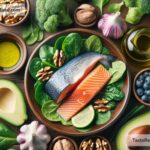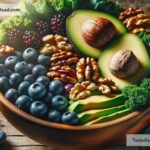Foods That Reduce the Risk of Vertigo: Eating for Better Balance
Have you ever felt the world spinning around you while standing still? That sensation is called vertigo—a feeling of dizziness caused by issues in your inner ear or nervous system. While vertigo itself isn’t a disease, it can be a symptom of other conditions, like Meniere’s disease, vestibular migraines, or inner ear infections.
Fortunately, your diet can play a key role in improving your balance and reducing your risk of vertigo. Eating the right foods can help ease symptoms and promote overall health. In this article, we’ll explore what you can add to your meals to help fight vertigo symptoms naturally.
1. Hydration: A Simple Foundation
Before we dive into specific foods, it’s important to talk about hydration. Dehydration is one of the most common causes of dizziness and vertigo. If your body doesn’t have enough water, your blood pressure can drop, and your brain may not get sufficient oxygen. This can lead to lightheadedness or the spinning sensation of vertigo.
Make sure you’re drinking plenty of water throughout the day. If you prefer something with flavor, herbal teas (like chamomile or ginger tea) or infused water with fruits like lemon and cucumber can help keep your hydration levels up while also supporting your inner ear health.
2. Ginger: Nature’s Anti-Dizziness Remedy
One of the most effective natural remedies for vertigo is ginger. Ginger has been used for centuries to treat nausea, dizziness, and motion sickness. It helps improve blood circulation and can calm your inner ear, which controls balance.
You can consume ginger in many forms—add fresh slices to tea, sprinkle powdered ginger into soups, or snack on candied ginger. Ginger tea in particular is a great option if you often experience vertigo symptoms.
3. Vitamin D-Rich Foods: Strengthen Your Inner Ear
Vitamin D is vital for strong bones, but did you know it also plays a role in maintaining balance? Studies have linked low vitamin D levels to vertigo, especially in people with benign paroxysmal positional vertigo (BPPV), a condition caused by tiny crystals moving inside the inner ear.
To boost your vitamin D intake, eat foods like salmon, mackerel, tuna, egg yolks, and fortified cereals. Spending time in the sunlight is another natural way to help your body produce vitamin D.
4. Foods High in Magnesium: Support Brain Health
Magnesium is a mineral that helps improve nerve function, relax blood vessels, and control the signals sent between your inner ear and brain. Low magnesium levels can increase the risk of dizziness and vertigo, so adding magnesium-rich foods to your diet is highly beneficial.
Foods high in magnesium include spinach, avocados, bananas, almonds, cashews, dark chocolate, and quinoa. Even a small handful of nuts or seeds daily can give your body the magnesium it needs to stay balanced.
5. Whole Grains: Stable Blood Sugar Is Key
Sometimes, vertigo is triggered by a drop in blood sugar. If you go long periods without eating or indulge in sugary snacks, your energy levels can crash, leaving you feeling dizzy. Whole grains are a great way to keep your blood sugar steady because they provide slow-releasing energy that fuels your body for hours.
Examples of whole grains to include in your diet are oats, brown rice, whole wheat bread, and quinoa. Pair whole grains with healthy protein sources like beans or eggs for a balanced meal that keeps dizziness at bay.
6. Dark Leafy Greens: Boost Blood Flow
Proper blood circulation is essential for keeping your inner ear and brain healthy. Dark leafy greens such as spinach, kale, and Swiss chard are filled with nutrients like iron and folate, which help your blood carry oxygen throughout your body.
Add greens to salads, smoothies, or soups for a nutrient-packed meal to support vertigo prevention.
7. Low-Sodium Foods: Manage Inner Ear Fluid
A high-sodium diet can lead to fluid retention, including in the inner ear. When the fluid buildup affects your inner ear’s balance center, it can increase your risk of vertigo. To prevent this, it’s a good idea to limit salty foods like chips, processed snacks, fast food, and canned soups.
Instead, focus on fresh fruits, vegetables, and low-sodium alternatives when cooking. Opting for herbs and spices instead of salt can add flavor to your meals without increasing sodium.
8. Vitamin C-Rich Foods: Fight Inflammation
Vitamin C is known for boosting your immune system, but it also plays a role in reducing inflammation and supporting inner ear health. Studies suggest that vitamin C may be helpful for people with Meniere’s disease—a condition that causes vertigo, ringing in the ears, and hearing loss.
Eat plenty of vitamin C-rich foods such as oranges, strawberries, bell peppers, broccoli, and pineapples. These colorful foods are not only delicious but also packed with nutrients to keep dizziness at bay.
9. Omega-3 Fatty Acids: Improve Nerve Communication
Omega-3 fatty acids are healthy fats that support brain function, reduce inflammation, and improve nerve communication between your inner ear and brain. Including omega-3-rich foods like salmon, walnuts, flaxseeds, and chia seeds in your diet can help maintain balance and reduce dizziness.
Final Thoughts
While food alone can’t cure vertigo, making small dietary adjustments can help prevent or reduce symptoms. Stay hydrated, eat nutrient-rich foods, and avoid processed snacks high in salt and sugar. Combined with other healthy lifestyle practices—like regular exercise and getting enough sleep—your diet can be a powerful tool to support balance and manage vertigo naturally. If your symptoms persist or worsen, consult a doctor to ensure you get the proper treatment for any underlying conditions.
Eating for better balance doesn’t have to be complicated. Start incorporating these foods into your meals today and enjoy the benefits of a more stable and grounded life!


